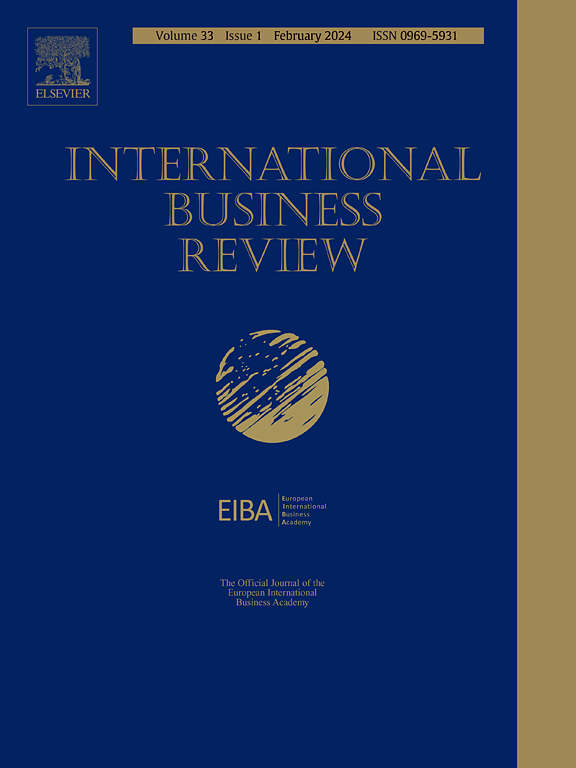跨境数字平台与新兴市场出口商的自主适应策略:能力建设视角
IF 6.1
1区 管理学
Q1 BUSINESS
引用次数: 0
摘要
在当今的数字时代,许多新兴市场(eme)的出口商参与跨境数字平台开展国际业务。虽然最近的研究已经承认了这些平台在eme国际营销实践中的重要性,但它们对国际营销策略的影响仍未得到充分探讨。我们通过运用组织学习理论开发一个概念框架来解决这一差距,该框架解释了参与跨境数字平台如何影响eme的营销能力,使他们能够采取酌情适应策略。我们还研究了这种关系如何受到偶然因素的影响,包括潜在因素(正式/非正式机构距离)和主动因素(平台的国际基础设施,CMO存在)。利用328家中国制造业中小企业的调查数据,我们发现中小企业参与跨境数字平台与其自主适应策略之间存在正相关关系,其中营销能力是中介因素。此外,这种正相关关系在较大的正式制度距离和平台提供的基础设施国际化程度下得到强化,但在非正式制度距离较低的东道国市场中被削弱。然而,CMO的存在对EMEs从跨境数字平台中获益的程度没有显著影响。这些发现有助于从理论上理解跨境数字平台和国际营销策略,同时为寻求实施有效国际营销策略的政策制定者和eme提供有价值的见解。本文章由计算机程序翻译,如有差异,请以英文原文为准。
Cross-border digital platforms and discretionary adaptation strategy of exporters in emerging markets: The capability building perspective
In today’s digital era, many exporters in emerging markets (EMEs) participate in cross-border digital platforms to conduct business internationally. While recent research has acknowledged the significance of these platforms in EMEs’ international marketing practices, their impact on international marketing strategies remains underexplored. We address this gap by applying organizational learning theory to develop a conceptual framework that explains how participation in cross-border digital platforms influences EMEs’ marketing capabilities, enabling them to adopt a discretionary adaptation strategy. We also examine how this relationship is influenced by contingent factors, including latent factors (formal/informal institutional distance) and active factors (platform’s international infrastructure, CMO presence). Using survey data from 328 manufacturing EMEs in China, we find a positive relationship between EMEs’ participation in cross-border digital platforms and their discretionary adaptation strategy, with marketing capabilities as the mediator. Moreover, this positive relationship is strengthened by greater formal institutional distance and the degree of internationalization of the infrastructure provided by the platforms, but weakened in host markets with lower informal institutional distance. However, the presence of a CMO has no significant effect on the extent to which EMEs benefit from cross-border digital platforms. These findings contribute to the theoretical understanding of cross-border digital platforms and international marketing strategies, while providing valuable insights for policy makers and EMEs seeking to implement effective international marketing strategies.
求助全文
通过发布文献求助,成功后即可免费获取论文全文。
去求助
来源期刊

International Business Review
BUSINESS-
CiteScore
14.10
自引率
6.90%
发文量
95
审稿时长
62 days
期刊介绍:
The International Business Review (IBR) stands as a premier international journal within the realm of international business and proudly serves as the official publication of the European International Business Academy (EIBA). This esteemed journal publishes original and insightful papers addressing the theory and practice of international business, encompassing a broad spectrum of topics such as firms' internationalization strategies, cross-border management of operations, and comparative studies of business environments across different countries. In essence, IBR is dedicated to disseminating research that informs the international operations of firms, whether they are SMEs or large MNEs, and guides the actions of policymakers in both home and host countries. The journal warmly welcomes conceptual papers, empirical studies, and review articles, fostering contributions from various disciplines including strategy, finance, management, marketing, economics, HRM, and organizational studies. IBR embraces methodological diversity, with equal openness to papers utilizing quantitative, qualitative, or mixed-method approaches.
 求助内容:
求助内容: 应助结果提醒方式:
应助结果提醒方式:


